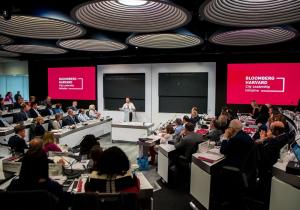When city hall can’t do it all: Building stronger partnerships

Whether it’s climate change, public health, homelessness, or any number of the world’s most critical concerns, cities are where some of the most promising public-sector innovations are happening today. But mayors can’t do everything themselves.
Even though mayors are essentially the CEOs of their cities, much lies outside their control. For example, a top priority on most mayors’ plates — creating jobs — isn’t so easy to do when it’s the private sector doing most of the hiring. Likewise, in the United States, many mayors are not in charge of the schools in their city, limiting what they can do directly to improve education. Then there’s resources: Even in the best-run cities, there’s never enough tax dollars on hand to accomplish everything that needs doing. And often, the real know-how to solve certain problems lies not in city hall but with subject-matter experts in local universities, companies or nonprofits.
This is why collaboration at the local level is so important. If mayors really want to deliver change, they know that the best solutions require bringing together the business community, the nonprofit sector, universities, philanthropy, neighborhood groups, and more. Building strong relationships with these organizations matters — but collaboration is about more than relationships. It’s about bringing together institutions that may have different missions and cultures, finding common language, and taking advantage of each other’s tools and expertise to work together to solve complex urban problems.
As critical as cross-sector collaboration is, it’s difficult to do well. That was a common theme we heard last summer when the Bloomberg Harvard City Leadership Initiative convened two first-of-its-kind executive training sessions, first for 40 mayors from around the world and second for 80 of their top deputies. Many attendees told us they fully understand how important forging effective partnerships is to accomplishing their goals. And they want to get better at it.
This week, we’re following up on that request. Ten of the cities whose mayors joined us last summer are sending eight people each to New York City for a special leadership session on cross-sector collaboration. These teams, which represent cities from the U.S., Canada, and the U.K., include members from city hall, business, schools, foundations and community organizations. Each is bringing a problem from back home — or an opportunity — that could be helped by cross-sector collaboration.
For example, the team from Louisville, Ky., wants to mobilize stakeholders throughout the community — including nonprofits, philanthropies, and schools — to rally support for a program that reduces gun violence among youth. The group from Phoenix aims to engage partners in efforts to combat the impacts of extreme heat. And the group from Memphis, Tenn., is tackling the issue of workforce development for 16- to 24-year-olds who are not already working or in school.
This week, they’ll engage with top faculty and practitioners from the Harvard Kennedy School, the Harvard Business School, and Bloomberg Philanthropies. And, perhaps more importantly, they’ll interact with each other and learn to work together better to deliver for their cities.
The curriculum, designed by faculty co-chairs Jorrit de Jong and Rawi Abdelal, and drawing from research by professors Mark Moore and Jan Rivkin, aims to build each city’s capacity for collaboration. The program design was informed by and contributes to ongoing research at the two Harvard schools on cross-sector collaboration, and is built around three key themes:
● Becoming better collaborators: Teams will learn how to identify public problems and opportunities that require collaboration, define their public value proposition, and envision what success looks like.
● Building better teams: Participants will share an experience that will help them unite around a common language and purpose, while advancing skills from building coalitions to handling the elements of negotiation that exist within every collaboration.
● Making progress: Teams will take what they learn and actively apply it to the projects they came with throughout the week so that they go back to their cities and mayors with concrete next steps.
For all but a handful of participants who also joined us last summer, this week’s session will be an entirely new experience. We’re excited to convene this new group to learn together, bond together, and build successful city strategies together.
Read more from the Bloomberg Harvard City Leadership Initiative session on cross-sector collaboration:
Bloomberg Philanthropies CEO Patricia E. Harris on mastering the art of collaboration

